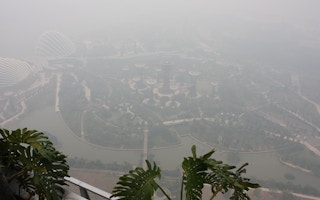Parliament on Tuesday (Aug 5) passed a bill that would impose fines of up to S$2 million on companies that cause or contribute to transboundary haze pollution in Singapore, but not before a lengthy debate in Parliament that saw Members of Parliament raise a multitude of questions and concerns over two days.
They ranged from the extraterritorial nature of the bill to what role the government can play in ensuring palm oil in products is sourced sustainably and whether the fines are high enough to act as a deterrent.
Addressing these questions, Environment and Water Resources Minister Vivian Balakrishnan said the Bill is “not a silver bullet”, but a step that introduces novel elements into the law.
“
Under international law, while states have the sovereign right to exploit their natural resources in accordance with their policies, they also have a responsibility to ensure this does not cause damage to neighbouring states
Vivian Balakrishnan, Environment and Water Resources Minister
On the question of extraterritorial application, Dr Balakrishnan clarified that under international law, while states have the sovereign right to exploit their natural resources in accordance with their policies, they also have a responsibility to ensure this does not cause damage to neighbouring states.
Dr Balakrishnan said Singapore also has the legal right under the Objective Territorial Principle to take action against those whose irresponsible actions elsewhere cause harm within Singapore. So the Bill gives Singapore the legal power to serve notices on entities, including those that do not have assets or a presence in Singapore.
Dr Balakrishnan said the notice would be served personally to an officer of the entity, when the individual or partner is in Singapore. He said the National Environment Agency would work closely with the Immigration and Checkpoints Authority to know when the person is in the country.
MPs also asked if the penalties are sufficient, considering the cap of S$2 million is but a “slap on the wrist” for some companies that see profits in the billions of dollars.
To this, Dr Balakrishnan said there is a need to tread carefully with the new legislation, as there is no precedence on how it will work in practice. He assured members that the Act will be reviewed when it comes into effect to see whether it works as a deterrent.
MP Christopher De Souza and Nominated Member of Parliament, Faizah Jamal, spoke about the role of consumers and how they can be empowered with the knowledge that products are made from oil palm that is sustainably sourced. This will allow them to put pressure on errant companies.
Dr Balakrishnan said while this should be encouraged by the Government, it should be led by consumer groups and non-government organisations.
After the session in Parliament wrapped, the minister posted on Facebook that he is glad that all MPs - opposition, nominated and PAP alike - supported the Bill.
“This will create criminal and civil liabilities for errant companies that cause haze by burning forests and peatlands. We have to make companies accountable for the harm they inflict on our health and environment,” Dr Balakrishnan wrote.








